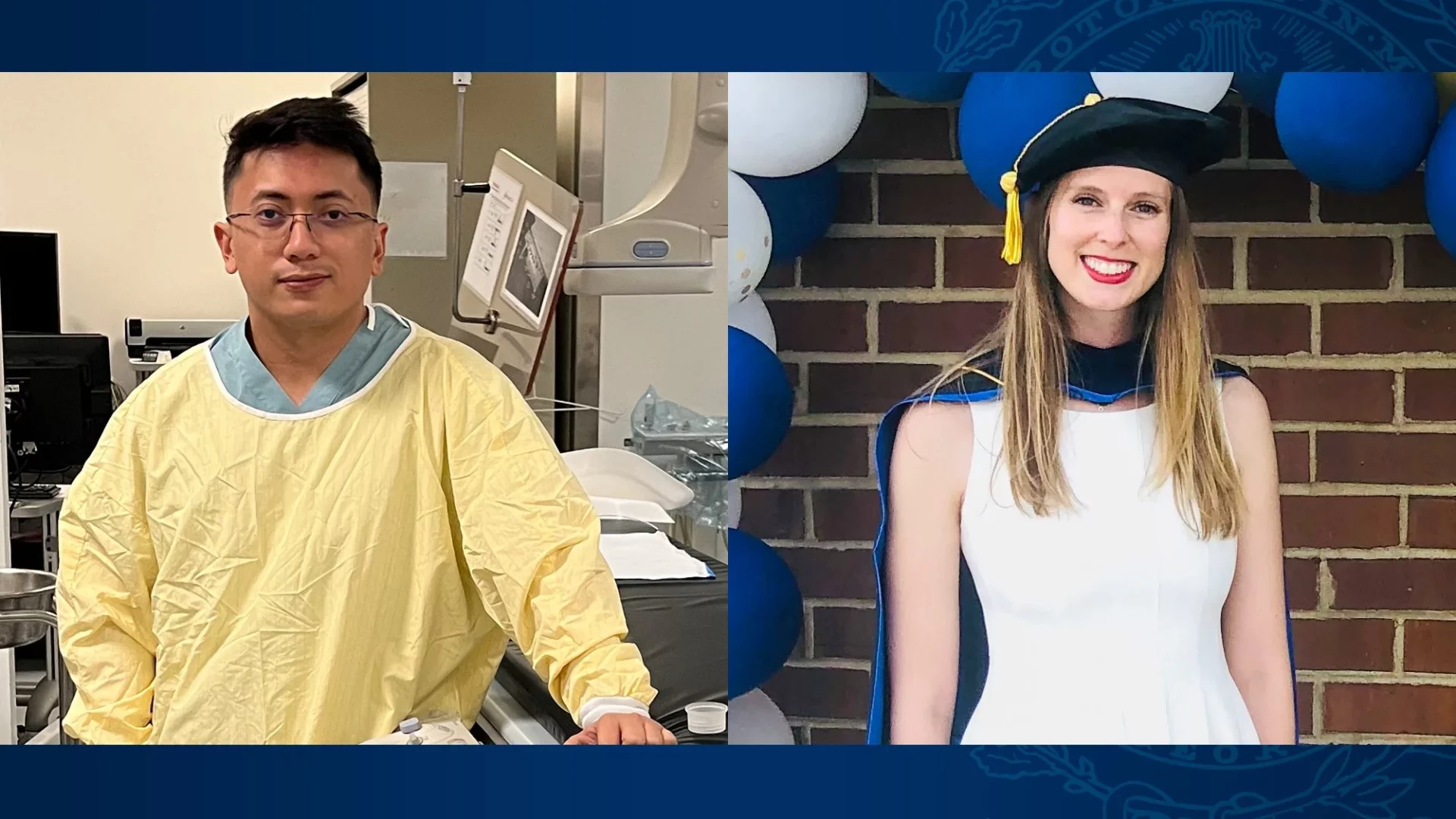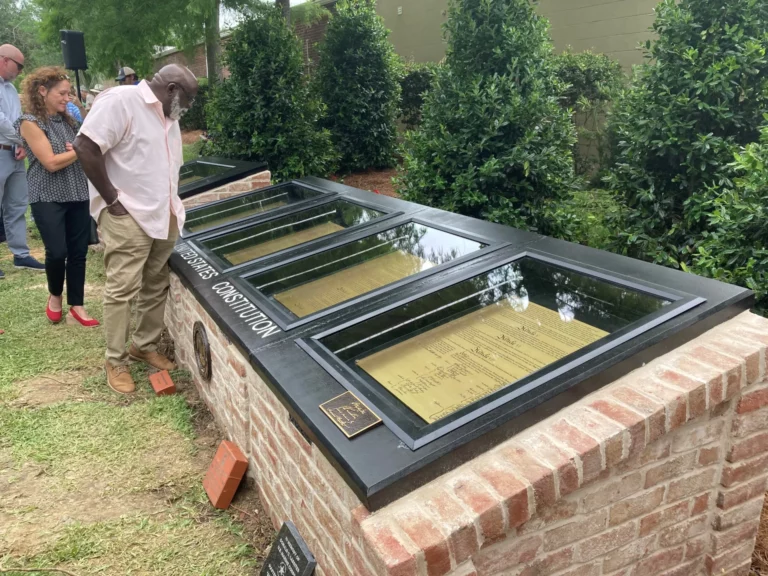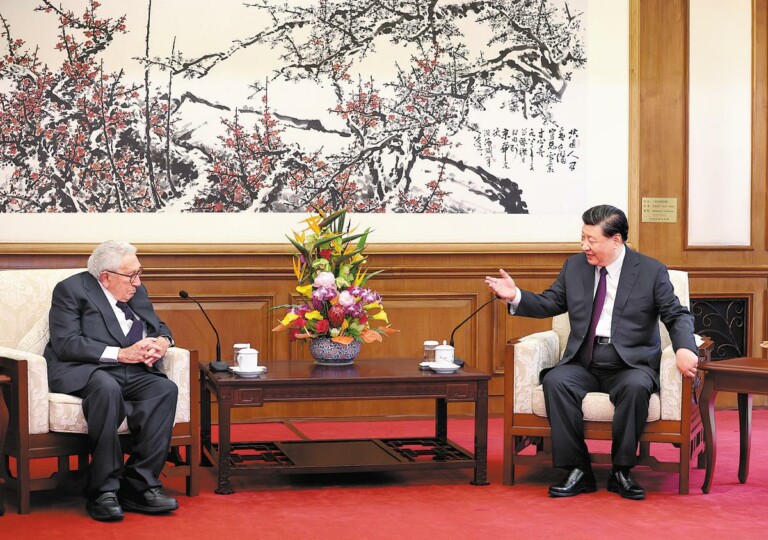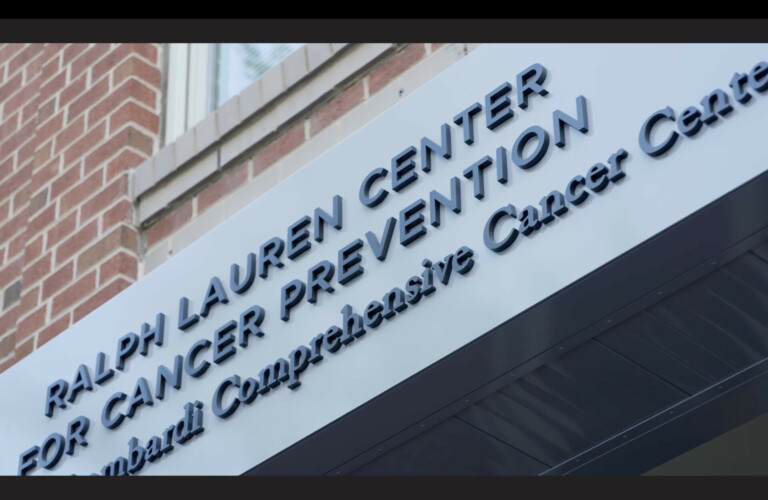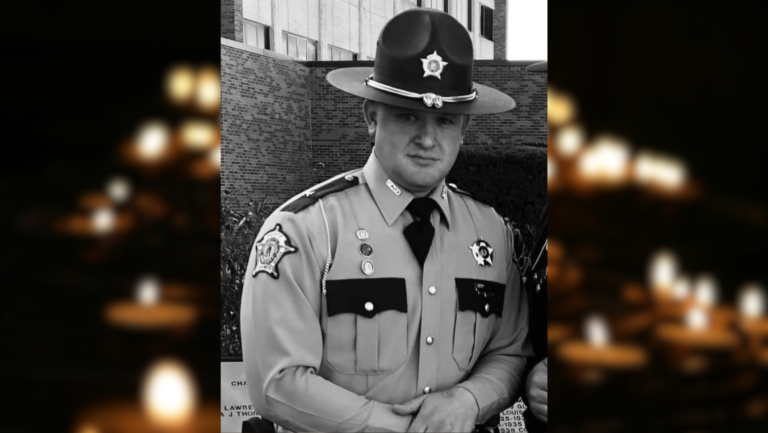Ever since their own families grappled with their own health crises, Dr. Ralf Martz Sulague (G’23) and Dr. Allison Fitzgerald (M’23, G’23) wanted to pursue careers taking care of patients’ health.
But they both knew they wanted to make an impact outside of the doctor’s office and came to Georgetown to expand the reach of their M.D. degrees. In the years since, Sulague has traveled to Ghana to research financial risk associated with major surgery, and Fitzgerald has made important contributions to pancreatic cancer research.
This past weekend, Sulague graduated with his master’s in global health, and Fitzgerald completed her dual Ph.D. and M.D. eight years after arriving at Georgetown.
Sulague leaves Georgetown on a mission to make surgery more accessible and improve cardiovascular disease treatments, and Fitzgerald is off to join the effort to treat and study cancer as a researcher and clinician.
Read on to see how these two doctors are working in their fields to improve health care for those who need it most — and the defining moment in their family histories that spun both of their lives toward a career in health care.
Making Surgical Care Accessible With Ralf Martz Sulague (G’23)
Growing up in a middle-class household in the Philippines, Dr. Ralf Martz Sulague (G’23) never took the health care of his family for granted.
However, due to financial constraints, he and his family always had to think twice before going to a doctor, often resorting to more inexpensive herbal medicines and other alternative forms of care.
Experiencing the Stinging Cost of Health Care
This all came to a head during Sulague’s second year of college when his uncle had a medical emergency that required surgery. Coming from a small town on the Philippine island of Bohol, getting treatment for some conditions was not as simple as driving across town to the doctor’s office — Sulague’s uncle had to sail to another island to receive quality health care.
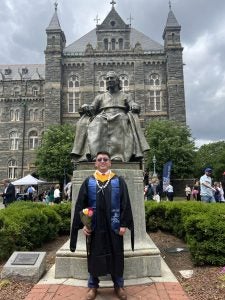
To cover the cost, Sulague’s family had to take on loans and sell property. Following this experience, Sulague could only imagine how much more difficult accessing health care would be for those on the margins.
“That made me realize if a middle-class family like mine had to do that just to be able to afford quality surgical care, how much more would it be for the many Filipino families who have way, way less,” Sulague said.
After the experience, Sulague was determined to pursue a career as a doctor. After completing his undergraduate education at a Jesuit university in Metro Manila, Sulague earned his M.D. in 2020 with the hopes of becoming a surgeon, a specialty that he found lacking in his province in the Philippines.
But he knew he wanted his work to extend beyond treating patients. He wanted to address the root causes behind patients’ inability to access quality and affordable health care around the world.
“I’m learning all of these clinical things, like how to diagnose myocardial infarction, pneumonia, or, let’s say a urinary tract infection. But I realized that the problem is more systemic,” he said. “Global health and medicine are two different things. Medicine is the science, but global health is the politics of medicine and deals with how to make health accessible to all.”
Pursuing Global Health at Georgetown
In 2020, Sulague watched COVID-19 ravage his home country and realized that he had to learn more to better serve his community. This realization led Sulague to Georgetown, where he pursued his master’s degree in global health at the Graduate School of Arts & Sciences and was the recipient of the Father Bienvenido Nebres, S.J. Scholarship for his passion for health and development solutions in the Philippines.
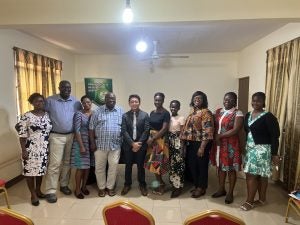
“I was telling myself I should equip myself for wherever God places me in the future, if ever I’d be given that opportunity to work in the government, rural health or in my province,” he said.
At Georgetown, Sulague concentrated his studies on improving financial access to surgery, a key concern in the field of global surgery — an emerging field focused on improving access to surgery around the world.
As part of his immersive field research experience, Sulague traveled to Ghana to assess the country’s social health insurance program and its ability to protect Ghanaians from exorbitant costs due to surgery. He said seeing the vulnerabilities in Ghana’s health care system only strengthened his resolve to continue fighting to expand health care access.
“Most of us are clinicians, go to clinics, and treat our patients. But the thing is, if we want to improve our outcomes as doctors, especially as surgeons, then we have to learn how to study our current treatments and their results. And research is a big part of that. If we want to push the boundaries of medicine and surgery, then we have to learn how to do research.”Ralf Martz Sulague (G’23)
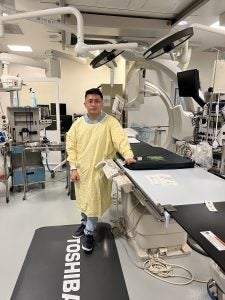
For Sulague, the master’s program gave him the tools to conduct research — an essential skill set to constantly improve the field of medicine outside the clinician’s office. He received the Exceptional Master’s Student Award in Science at this year’s Graduate Student Awards Ceremony for his academic achievement and research.
“Most of us are clinicians, go to clinics, and treat our patients. But the thing is, if we want to improve our outcomes as doctors, especially as surgeons, then we have to learn how to study our current treatments and their results. And research is a big part of that,” Sulague said. “If we want to push the boundaries of medicine and surgery, then we have to learn how to do research.”
Today, Sulague is continuing his work as a postdoctoral scientist at the Smidt Heart Institute at Cedars-Sinai Medical Center in Los Angeles. He has nothing but gratitude for how far he’s been able to come.
“When the tough moment comes, you have to remember your why. And every time I try to remind myself of that experience of mine, I’m filled with gratitude for how far I have come,” Sulague said. “When I first made that decision that I wanted to be a doctor, I never really thought everything else would follow up to this point, so it makes me feel very grateful.”
Trailblazing New Paths to Treat Cancer With Allison Fitzgerald (M’23, G’23)
Dr. Allison Fitzgerald (M’23, G’23) was 12 years old when her mother was diagnosed with breast cancer.
As a child, Fitzgerald didn’t know what to make of her family’s health crisis, recalling how she would rejoice in ice cream and cookies for dinner while her mother was bedridden from chemotherapy treatments.
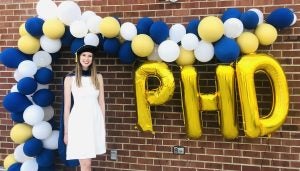
Yet seeing her family affected by cancer at such a young age spurred a deeper desire to learn more about the disease that would shape Fitzgerald’s trajectory.
“Seeing her go through chemo at such a formative time in my life when you’re just trying to figure out what the world is like and what you’re going to do, it was my way of learning more about what happened and why it happened and trying to make it so that people in the future wouldn’t have to go through what my mom went through,” Fitzgerald said.
Carving a Path to Medicine
What started as poring through National Geographic science articles in middle school turned into taking as many science classes as she could in high school. Fitzgerald also attended a science camp at the cutting-edge Cold Spring Harbor Laboratory on Long Island.
After studying biochemistry at Colorado College as a first-generation college student, Fitzgerald became a research technician at the Dana-Farber/Harvard Cancer Center. It was in the labs in Boston that Fitzgerald saw medical oncologists working side-by-side with Ph.D. cancer researchers. She recognized how the doctors and researchers each brought their own unique skillsets and perspectives to every research question — and sometimes wouldn’t always agree on the best path forward.
She knew she wanted to live in both of those worlds of conducting research and treating cancer patients.
“When you’re a practicing physician, it’s wonderful because you get to make such a big difference in your patients’ lives, but you’re limited to the number of patients that you see,” she said. “As a scientist, you can hopefully make advances in the understanding of diseases, and that helps way more people than you would be able to help as a practicing physician.”
Making Strides in Pancreatic Cancer Research
For the last eight years, Fitzgerald has worked to earn her M.D. and Ph.D. simultaneously at Georgetown. She chose Georgetown to work alongside doctors and researchers at the Lombardi Comprehensive Cancer Center.
While her two degrees took the better part of a decade, it didn’t take walking across the stage at commencement for Fitzgerald to start making a difference in oncology.
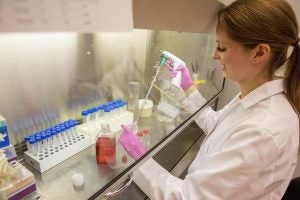
Fitzgerald has been studying pancreatic cancer and methods to treat the disease with new immunotherapies, a method of treatment that activates a patient’s own immune system to fight cancer cells. She’s worked alongside renowned immunotherapy researcher Dr. Louis Weiner, director of Georgetown Lombardi, and Dr. Shangzi Wang for her dissertation.
“What’s so promising about immunotherapy is once you change the patient’s immune system to recognize the cancer cells, in a lot of patients that immune system is changed forever,” Fitzgerald said. “Other cancer treatment types don’t usually offer that kind of long-term sustainable cure without requiring additional treatment, so immunotherapy is a tremendous breakthrough in the cancer world, and it’s been incredible to see.”
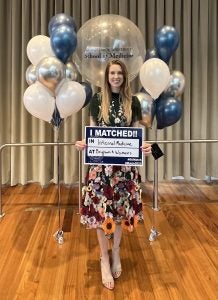
Because pancreatic cancer is often detected so late, it’s responsible for a disproportionately high number of cancer deaths and is projected to be the third leading cause of cancer death in the United States. Pancreatic cancer is also notoriously difficult to treat because the cancerous tumor is surrounded by a tough shell of scar tissue. Fitzgerald and her colleagues have worked to create new immunotherapies capable of penetrating the scar tissue to introduce the patient’s own immune cells to fight the cancer cells.
Fitzgerald knew she was onto something when an experiment demonstrated that her immunotherapy treatment enabled mice already cured of pancreatic cancer to resist new pancreatic cancer cells coming into their systems.
“That was a very exciting, ‘Wow, this actually might have real implications for humans if it can induce the same sort of immune response in patients,’ [moment],” Fitzgerald said.
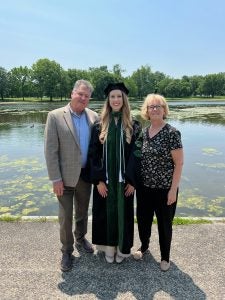
In February, her research contributed to the design of a clinical trial that is enrolling pancreatic cancer patients today. Fitzgerald hopes that the treatment will provide patients who have exhausted all other treatment options a glimmer of hope.
Today, Fitzgerald’s mother is healthy and cancer-free. She got to see her daughter walk across the stage at commencement. Fitzgerald begins her residency in internal medicine with the Brigham and Women’s Hospital in Boston and is eager to treat her patients at the doctor’s office while pushing the boundaries of oncology in the research labs to bring hope to all those affected by cancer.
“Being able to have such a big impact for patients’ lives and see patients over many years, it’s a much more positive field than people think,” Fitzgerald said. “A lot of people think cancer and they immediately think very sad things, but a lot of cancer patients do very well, and so it’s really wonderful to be part of the team that helps them get there.”
Source: Georgetown Edu

